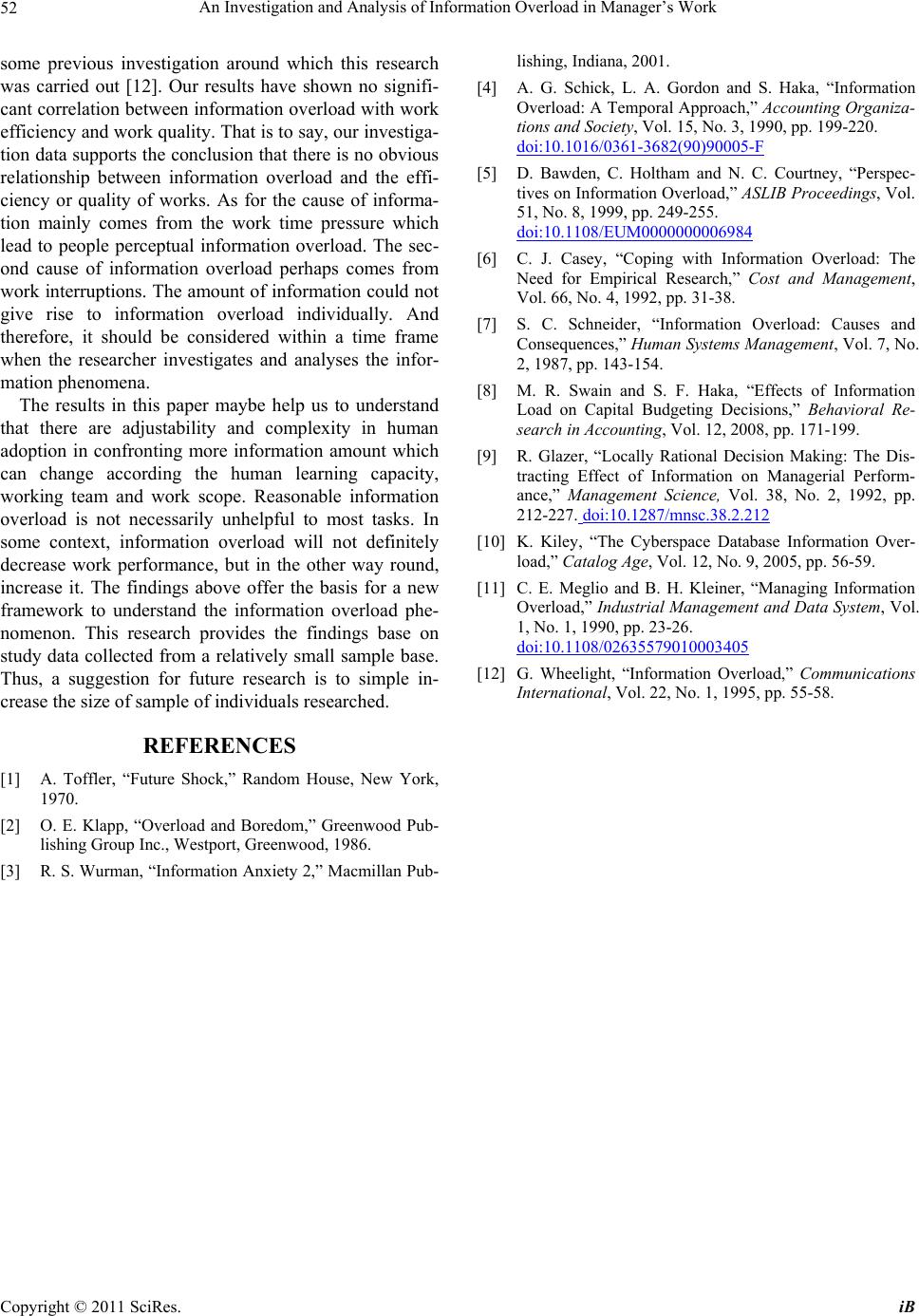
An Investigation and Analysis of Information Overload in Manager’s Work
52
some previous investigation around which this research
was carried out [12]. Our results have shown no signifi-
cant correlation between information overload with work
efficiency and work quality. That is to say, our investiga-
tion data supports the conclusion that there is no obvious
relationship between information overload and the effi-
ciency or quality of works. As for the cause of informa-
tion mainly comes from the work time pressure which
lead to people perceptual information overload. The sec-
ond cause of information overload perhaps comes from
work interruptions. The amount of information could not
give rise to information overload individually. And
therefore, it should be considered within a time frame
when the researcher investigates and analyses the infor-
mation phenomena.
The results in this paper maybe help us to understand
that there are adjustability and complexity in human
adoption in confronting more information amount which
can change according the human learning capacity,
working team and work scope. Reasonable information
overload is not necessarily unhelpful to most tasks. In
some context, information overload will not definitely
decrease work performance, but in the other way round,
increase it. The findings above offer the basis for a new
framework to understand the information overload phe-
nomenon. This research provides the findings base on
study data collected from a relatively small sample base.
Thus, a suggestion for future research is to simple in-
crease the size of sample of individuals researched.
REFERENCES
[1] A. Toffler, “Future Shock,” Random House, New York,
1970.
[2] O. E. Klapp, “Overload and Boredom,” Greenwood Pub-
lishing Group Inc., Westport, Greenwood, 1986.
[3] R. S. Wurman, “Information Anxiety 2,” Macmillan Pub-
lishing, Indiana, 2001.
[4] A. G. Schick, L. A. Gordon and S. Haka, “Information
Overload: A Temporal Approach,” Accounting Organiza-
tions and Society, Vol. 15, No. 3, 1990, pp. 199-220.
doi:10.1016/0361-3682(90)90005-F
[5] D. Bawden, C. Holtham and N. C. Courtney, “Perspec-
tives on Information Overload,” ASLIB Proceedings, Vol.
51, No. 8, 1999, pp. 249-255.
doi:10.1108/EUM0000000006984
[6] C. J. Casey, “Coping with Information Overload: The
Need for Empirical Research,” Cost and Management,
Vol. 66, No. 4, 1992, pp. 31-38.
[7] S. C. Schneider, “Information Overload: Causes and
Consequences,” Human Systems Management, Vol. 7, No.
2, 1987, pp. 143-154.
[8] M. R. Swain and S. F. Haka, “Effects of Information
Load on Capital Budgeting Decisions,” Behavioral Re-
search in Accounting, Vol. 12, 2008, pp. 171-199.
[9] R. Glazer, “Locally Rational Decision Making: The Dis-
tracting Effect of Information on Managerial Perform-
ance,” Management Science, Vol. 38, No. 2, 1992, pp.
212-227. doi:10.1287/mnsc.38.2.212
[10] K. Kiley, “The Cyberspace Database Information Over-
load,” Catalog Age, Vol. 12, No. 9, 2005, pp. 56-59.
[11] C. E. Meglio and B. H. Kleiner, “Managing Information
Overload,” Industrial Management and Data System, Vol.
1, No. 1, 1990, pp. 23-26.
doi:10.1108/02635579010003405
[12] G. Wheelight, “Information Overload,” Communications
International, Vol. 22, No. 1, 1995, pp. 55-58.
Copyright © 2011 SciRes. iB